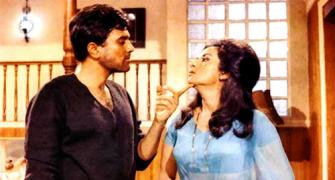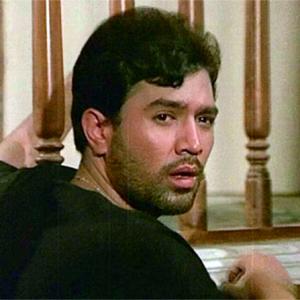Ittefaq has a gagster attitude, plenty of light touches and it announces Abhay Chopra as a mainstream talent to watch out for, says Sreehari Nair.

About the twist in Ittefaq: it comes right at the conclusion, cloaked in designer wear and armed with a for-the-camera snigger.
Will it surprise you? It should.
Will you be cock-a-hoop? I doubt.
This is a movie written from the ending backwards; meaning, everything from character motivations, to character continuum, to your feelings for those murdered and your sense of justice are all sacrificed for that last bit of wallop at the end!
But having teased you with this minor, throwaway frustration, I must tell you that the movie works because director Abhay Chopra knows how to tell a story visually. And so he makes the script look and play better than it deserves to.
Ittefaq has fast, incisive cutting, an anxious, edgy style and, most importantly, Chopra has a humour about the whole thing. In fact, I don’t remember another blood-thriller in recent times that offered me so many tickles.
The writer-director team seems to be telling us, 'Look, you little Satans, we know you’ve come for that big twist at the end. So why not laugh your way to it?'
So when Sidharth Malhotra’s Vikram Sethi, accused of double-murder, cries for his deceased wife, the investigating officer (Akshaye Khanna as Dev) pulls Sethi’s breakfast plate away from him while commenting: 'Sambhar mein gir jaayega (Your tears will fall into the sambhar)!'
Malhotra’s tears are satirised more than once here.
When the police corner him for murdering his wife, and when he asks them sheepishly, 'Are you going to take me with you?', a police constable replies, 'Of course... since we don’t think your wife can come right now.'
A maid dunks into a tension-filled home and demands she be allowed to clean it. 'I can’t leave it for tomorrow as it will stink,' she announces. (Poor thing, she doesn’t know that, inside, there’s more than just dust to be wiped away.)
A family notifies the police that they’ve some ‘information’ to pass and when Khanna and his subordinate arrive, they see the family all decked up to give a television interview.
The humour goes beyond such small touches of behaviour or remarks made offhand. In a way, the movie becomes a burlesque of itself.
The case is declared as ‘high-profile,’ as if uttered with single-quotes around the word.
The clues are often laid out for you to catch them and feel good about yourself. (In the theatre, I heard a lady behind me guessing each plot-twist two beats before the police on the screen and badgering her man with a, 'Didn’t I tell you? Didn’t I tell you? You keep rebuffing me!')
One gets the feeling that Chopra and his writers perhaps wanted Ittefaq to play like a send-up of murder mysteries and a pulpy tribute to the movies.
Watch out, for example, how Sonakshi Sinha’s Maya arrives for questioning at the police station, a day after her husband’s death: her lips consciously darkened with lipstick and her hair set like a Japanese Origami Teacher.
In a scene which has Sonakshi getting into a duel with Malhotra’s Vikram Sethi, she fights almost like the Bride from Kill Bill.
That fight is a part of narrative -- one of two in Ittefaq -- which has Sonakshi’s Maya and Sidharth’s Sethi, offering Akshaye Khanna’s Dev their versions about what transpired at Sonakshi's apartment on the night that her husband was murdered.
The pitching of the conflicting narratives here are closer to Kurosawa’s Rashomon than, say in Meghna Gulzar’s Talvar because, as in Rashomon, you suspect the integrity of both narrators -- with each desperate to come out as a person of honour.
In Sidharth's version, he is the hassled one while she is the earth-mother seductress while, in Sonakshi's version, she is the mouse and he is the aggressor.
Chopra peppers each version with scenes of frantic humour. At one point, Maya says she wants to use the washroom and Sethi, sensing risk, asks her to ‘do it’ keeping the door open.
'You’ll have to turn around then,' she says assertively.
Whose version you believe may boil down to who you think is a better actor; speaking for myself, I kept cheering on for Sonakshi to come out clean.
Surrounded by unreliable narrators and policemen going for their 40 winks and their tiny moments of respite (Chopra loves the policemen; he’s constantly poking at their bellies), there’s Akshaye Khanna’s Dev.
Looking fitter than ever before and wearing sparkling shoes, Akshaye presides over the investigation with an erect posture and his bag of metaphors (bhalu (bear), bhutta (corn), they’re all invoked for comparisons).
He’s terrific because he understands the jocular spirit in which this movie is made and, as if endorsing this spirit wholeheartedly, the man keeps swallowing his punchlines.
Dev calls his wife Babe and Mandira Bedi, playing Babe, offers us the linkage between this Ittefaq and its spiritual predecessor.
While I thought Yash Chopra’s 1969 version was an exercise in self-seriousness and piety and this, with its constant playfulness, is an upgraded avatar by all means, you’d remember that the original was inspired by a hokey Hollywood thriller called Signpost To Murder whose tagline read: Are we all Potential Killers?
Mandira Bedi, here, speaks that tagline in passing and it pervades this picture. (If you wish to zero in on the killer, look to that tagline!)
Is Ittefaq a great movie? No, it isn’t.
But its lightness of tone, its gagster attitude and its small digressions in the face of despair, together render it watchable.
The film has wonderful shots of Mumbai captured in all its wetness (the romantic side of Mumbai inverted here for something more macabre) and it announces Abhay Chopra as a mainstream talent to watch out for.
Chopra has a fine sense of composition, pacing (watch out for those Match Cuts: in one instance, Sonakshi Sinha opens a bottle of liquor and Chopra cuts to a scene of Akshaye Khanna holding a glass of tea) and a love for genre-cinema that he makes no attempt to mask.
This is a murder mystery for murder mystery-lovers and its deficiencies and heights are built into its rhythm.
As far as its final twist goes, Ittefaq is a whocareswhodunit but what it does have, as compensation, is the shock and suggestiveness of pulp served hot.










